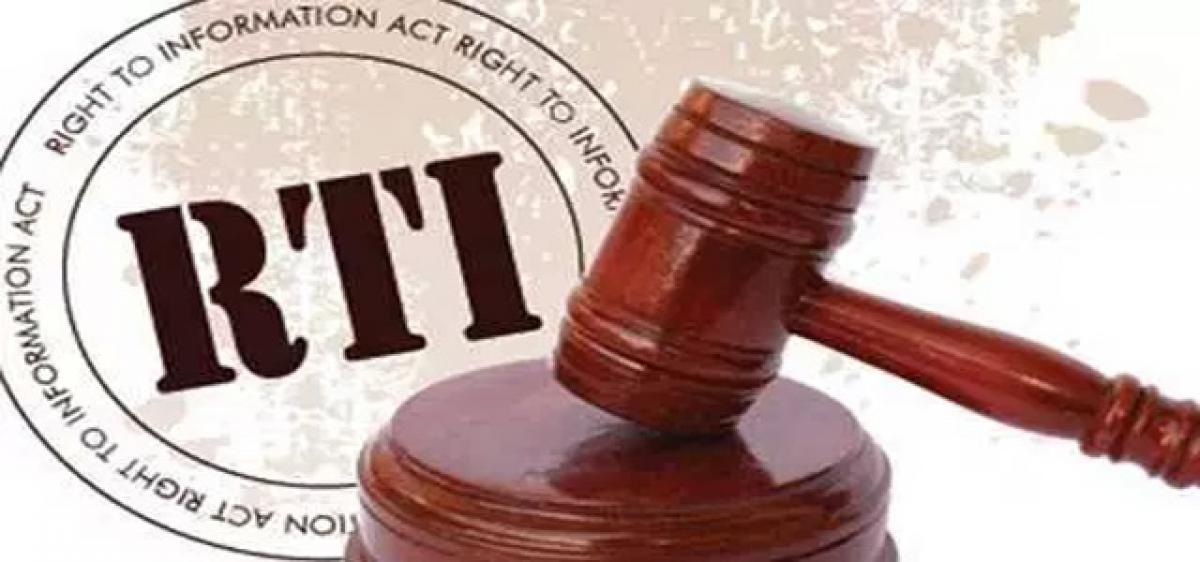Live
- Maha Kumbh Mela: Understanding Its Unique Significance
- YouTube Introduces Real-Time Multiplayer Gaming with Playables
- AUS W vs IND W 3rd ODI: Smriti Mandhana Makes History with Stunning Century in Perth
- CM Revanth Reddy Congratulates Telangana Candidates Advancing to UPSC Interviews
- Collector Inspires Students to Excel Through Discipline, Hard Work, and Smart Work
- District Collector Directs Officials to Expedite Paddy Procurement Process
- SP T. Srinivas Rao Inaugurates State-of-the-Art Volleyball Court for Police Personnel in Jogulamba Gadwal
- Geeta Jayanti Celebrations Organized at Maldakal Thimmappa Swamy Temple
- Indiramma Housing Scheme Survey Reviewed by District Collector
- Government Committed to Resolving ASHA Workers' Issues: Minister Damodar Raja Narasimha
Just In

Andhra Pradesh Information Commission, which is supposed to uphold the tenets of the Right to Information Act, has miserably failed in its mission with the performance of the Chief Information Commissioner followed by the Information Commissioners in providing information to the applicants and giving necessary orders pertaining to appeals falling below the desired level.
Applicants get no reply even after years
Hyderabad: Andhra Pradesh Information Commission, which is supposed to uphold the tenets of the Right to Information Act, has miserably failed in its mission with the performance of the Chief Information Commissioner followed by the Information Commissioners in providing information to the applicants and giving necessary orders pertaining to appeals falling below the desired level.
Neither the Chief Information Commissioner nor the Information Commissioners are disposing of the cases within the stipulated and mandatory period diluting the spirit of the enactment, as per the information gathered by The Hans India in this respect.
In an application under RTI, the information was sought regarding the list of cases between January 1, 2006 and December 31, 2015 pending with the information commission. The PIO of the Information Commission in response to the application released incomplete information except the Endowment cases which were stayed by the High Court.
Without giving reasons as to why those cases were pending, the PIO stated that a case registered during the tenure of the then Chief Information Commissioner C D Arha on October 29, 2009 with the No. 10393/SCIC/2009 was not disposed off till date.
After the retirement of C D Arha, none of the chief information commissioners Jannat Hussain, S Prabhakar Reddy, M Ratan and V Venkateswarlu, who headed briefly for a month, disposed of the case in all these years.
Ravuri Ramesh of Nellore sought information regarding the expenditure of the then Governor Narayan Dutt Tewari on foreign jaunts, the expenditure of the Governor’s office between 2004 and 2009 and information manual which should have been uploaded on to the government website suo motu. He is yet to get the information.
Likewise, the appeals of T Gangadhar of Ongole with the No 8042/CIC-MR/2010 filed on July 10, 2010, and that of G Mohan Rao of Hyderabad with the No. 8470/CIC-MR/2010 appear in the government website www.apic.gov.in as under process.
All the above three cases pertain to the General Administration Department. However, the information commissioners boast before the media that they have been disposing of the appeals within one or two months. In practice, it is proved that it is not so. A glance at the pending cases would reveal the facts.
In the office of the Chief Information Commission as many as sixty appeals and complaints received between 2009 and 2015 are pending. The PIO did not give any reasons for the pending of the appeals.
In the office of the Information Commissioner P Vijay Babu, 769 cases filed between 2010 and 2015 are pending for disposal.
The PIO stated that the stay orders issued by the High Court were the reason for the pending of majority cases belonging to Endowment Department.
In the office of Chief Information Commissioner M Ratan, as many as 199 cases filed between 2010 and 2015 were pending. The PIO did not elaborate on the reasons for pending excepting Endowment cases.
In the office of Lam Tantia Kumari, 179 cases are pending till December, 2015. The PIO did not give any reasons for pending.
In the office of Imtiaz Ahmad, only one case filed in 2014 was pending but reasons were not given. In the office of M Vijayanirmala, two cases were pending though reasons were not given.Though the government has been spending crores of rupees on the office, it is not known why the cases are pending and the motive for the delay in disposing of the cases.
To cap it all, when the PIO was asked to give the name of official and his designation who failed to provide information to take action against him, it was promptly stated that it was not applicable.

© 2024 Hyderabad Media House Limited/The Hans India. All rights reserved. Powered by hocalwire.com







